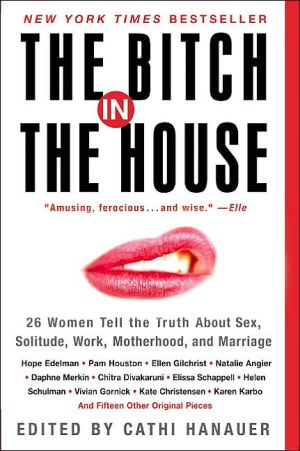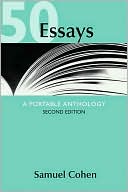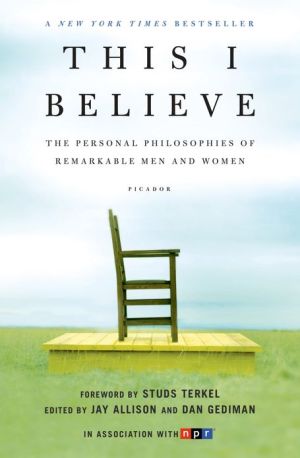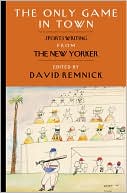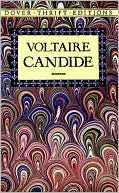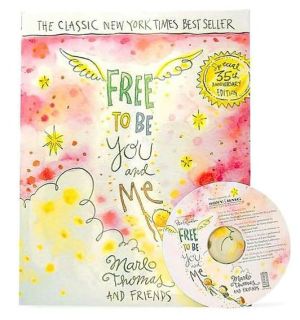Bitch in the House: 26 Women Tell the Truth about Sex, Solitude, Work, Motherhood, and Marriage
Virginia Woolf introduced us to the “Angel in the House”, now prepare to meet... The Bitch In the House.\ Women today have more choices than at any time in history, yet many smart, ambitious, contemporary women are finding themselves angry, dissatisfied, stressed out. Why are they dissatisfied? And what do they really want? These questions form the premise of this passionate, provocative, funny, searingly honest collection of original essays in which twenty-six women writers—ranging in age...
Search in google:
Virginia Woolf introduced us to the “Angel in the House”, now prepare to meet... The Bitch In the House. Women today have more choices than at any time in history, yet many smart, ambitious, contemporary women are finding themselves angry, dissatisfied, stressed out. Why are they dissatisfied? And what do they really want? These questions form the premise of this passionate, provocative, funny, searingly honest collection of original essays in which twenty-six women writers—ranging in age from twenty-four to sixty-five, single and childless or married with children or four times divorced—invite readers into their lives, minds, and bedrooms to talk about the choices they’ve made, what’s working, and what’s not. With wit and humor, in prose as poetic and powerful as it is blunt and dead-on, these intriguing women offer details of their lives that they’ve never publicly revealed before, candidly sounding off on: • The difficult decisions and compromises of living with lovers, marrying, staying single and having children • The perpetual tug of war between love and work, family and career • The struggle to simultaneously care for ailing parents and a young family • The myth of co-parenting • Dealing with helpless mates and needy toddlers • The constrictions of traditional women’s roles as well as the cliches of feminism • Anger at laid-back live-in lovers content to live off a hardworking woman’s checkbook • Anger at being criticized for one’s weight • Anger directed at their mothers, right and wrong • And–well–more anger... “This book was born out of anger,” begins Cathi Hanauer, but the end result is an intimate sharing of experience that will move, amuse, and enlighten. The Bitch in the House is a perfect companion for your students as they plot a course through the many voices of modern feminism. This is the sound of the collective voice of successful women today-in all their anger, grace, and glory. From The Bitch In the House: “I believed myself to be a feminist, and I vowed never to fall into the same trap of domestic boredom and servitude that I saw my mother as being fully entrenched in; never to settle for a life that was, as I saw it, lacking independence, authority, and respect.” –E.S. Maduro, page 5 “Here are a few things people have said about me at the office: ‘You’re unflappable.’ ‘Are you ever in a bad mood?’ Here are things people—okay, the members of my family—have said about me at home: ‘‘Mommy is always grumpy.’ ‘Why are you so tense?’ ‘You’re too mean to live in this house and I want you to go back to work for the rest of your life!’” –Kristin van Ogtrop, page 161 “I didn’t want to be a bad mother I wanted to be my mother-safe, protective, rational, calm-without giving up all my anger, because my anger fueled me.” – Elissa Schappell, page 195Publishers WeeklyIn the spirit of Virginia Woolf, who wrote of killing the "Angel in the House," these 26 women mostly professional writers focus on the inner "bitch": the frustration, anger and rage that's never far from the surface of many women's lives. They sound off on the difficult decisions of living with lovers, marrying, staying single and having children. Those who haven't chosen the single life are almost always frustrated by their mates' incompetence or their toddlers' neediness. (They reserve special scorn for overly laid-back live-in lovers content to live off a hardworking woman's checkbook.) While a handful of entries touch other sources of anger being criticized for one's weight, simultaneously caring for ailing parents and a young family, coping with a husband who's out to win his baby daughter's loyalty most focus on the love vs. work problem. For many of these women, this means a struggle over the right to be a bitch and inflict unpleasantness on others for the sake of a higher goal (one's work) versus the feminine imperative to "make nice." While unbridled rage is terribly cathartic even in print it's the quieter moments that provide more food for thought. Daphne Merkin's observation that she's "more equipped to handle the risks of loneliness than those of intimacy" and thus better off divorced, or Nancy Wartik's thought that "some compromises might actually be healthy," will ring true for many readers. Others may find it comforting to know that even smart, articulate, successful women can have deeply unsettled inner lives. Copyright 2002 Cahners Business Information.
Excuse Me While I Explode\ My Mother, Myself, My Anger\ E. S. Maduro\ \ \ My parents met and started dating on the same day, at the age of thirteen. Forty-five years later, my father still glows when he tells the story of seeing my mother on her first day at his school, and how he offered to walk her home that very afternoon. They dated throughout high school, went to the same college, and got married the day before their graduation, at age twenty-one -- three years younger than I am today. After college my father went to graduate school and eventually became a history professor; my mother worked as a schoolteacher for a while; they bought a cheap house in the countryside and started a family. Presto, the American Dream.\ When my older sister was born, my mother stopped working out of the house and became the mom I know her as. The mom who maintained a spotless house and a balanced checkbook and found the time to praise and nurture two growing children, all while having dinner ready and waiting, on the table, every night by 6:30. The mom who put off a career until her mid-forties so she would be available to her family -- which she still is -- though that is not to say she didn't work. My mother's job included, but was never limited to, pickling cucumbers, making jam, doing laundry for four people, changing diapers, teaching two children to read, doing all the grocery shopping for a family, cooking three meals a day (making sure a vegetable was included at dinner), cleaning the house, doing art projects, building snowmen, feeding a dog, driving to the doctor's office, picking kids up from piano lessons, going toparent-teacher conferences, sewing hems in school uniforms, ironing men's button-down shirts ... and so on. I think there are few résumés out there that could top my mother's were she ever to think it worthy of writing -- which she never would.\ As a young child -- naturally, I suppose -- I don't really remember being aware that my mother existed between the time I left for school in the morning and the time she arrived at the bus stop to meet me coming home. Laundry and dusting and shopping were far outside my elementary-school-age mind, and if chores were done when I got home, it certainly didn't catch my attention. As I grew older, however, my awareness of our household began to change. My mother went back to school and, at age forty-five, became a special ed teacher. After that, she often came home exhausted at 5:30 and began making dinner. Saturdays and Sundays she woke up early to rush all over, cleaning, cooking, shopping, organizing the calendar. Monday mornings she'd be up at 4:30 to write a report that had been neglected over the weekend, then she'd make me breakfast before school and zip off to work. Gradually, I began to notice that she never seemed to have a moment to herself. Simultaneously, I realized that my father, who took care of all the "manly" household chores -- chopping wood, killing mice -- still had time for a well-respected career and a whole slew of regular hobbies. The setup began to seem drastically unfair to me. Free time, to my high school mind, was an absolute necessity, and I was witness to the fact that my mother seemed to be getting none of it.\ This is not to say that I suddenly dropped to my knees before my mother, realized the saint that she was, and thanked her. Instead, I became disappointed in her and -- to my current shame and regret -- ridiculed her for being so undemanding about her own needs and so willing to dedicate herself to maintaining the house and serving us. I became angry at both of my parents: at my father that his chores (take apart and reassemble the kitchen sink, work in the garden, snow-blow the driveway) seemed interesting and challenging and were always impressive to friends and relatives, while my mother's endless chores seemed layered in routine and monotony. Both my parents had careers now, but it still fell to my mother to do every trivial and mindless thing that needed to be done, and I was frustrated with her for never seeming to mind this or to demand more help from my father.\ I spent hours as a teenager talking to her (rarely listening) about why she was so accepting of her role in our family. I would recount the way my father would stride into the house after work and she would politely have dinner waiting for him; the way there was an unspoken sentiment in our house that his career was more important than hers. "Why don't you divorce him and find a husband who will offer to clean up the kitchen after dinner and let you sit down for once?" I would yell; or, "How come his job takes precedence over everything else while yours has to fit around all the other things you do and have always done?" Somehow, my mother was always able to shrug me off -- to reply that she was fine, that someday I would understand. But I wasn't at all sure that I would, or that she was. What's more, I believed myself to be a feminist, and I vowed never to fall into the same trap of domestic boredom and servitude that I saw my mother as being fully entrenched in; never to settle for a life that was, as I saw it, lacking independence, authority, and respect.\ . . .\ \ \ I met my own boyfriend, Paul, during my senior year of college. He was absolutely the furthest thing possible from my father, which was exactly what I was looking for at the time. Though I love my father passionately, I was certain that the man of my life would know how to cook dinner and clean the house, would offer to do the dishes, would fold the laundry without being asked. My goal was to avoid the domestic life that my mother had found for herself; the first step was to have a liberal, open-minded boyfriend. I found one with dreadlocks, a nose ring, and a passion for that most nonacademic of subjects, music -- just the opposite of my traditional and overly intellectual father.\ The Bitch in the House. Copyright © by Cathi Hanauer. Reprinted by permission of HarperCollins Publishers, Inc. All rights reserved. Available now wherever books are sold.
IntroductionIMe, Myself, and IExcuse Me While I Explode: My Mother, Myself, My Anger3Getting the Milk for Free15Crossing to Safety23Moving In. Moving Out. Moving On35Papa Don't Preach45Memoirs of an Ex-Bride: Looking Back. Looking Ahead53IIFor Better and WorseI Do. Not.: Why I Won't Marry65Killing the Puritan Within73Houseguest Hell: My Home Is Not Your Home85A Man in the Heart91Why I Hate That My Mother Was Right (Well ... About Most Things): Turning into Elizabeth Taylor101How We Became Strangers111Erotics 102: Staying Bad. Staying Married123My Marriage. My Affairs133IIIMommy MaddestMy Mother's Ring: Caught Between Two Families147Attila the Honey I'm Home159The Myth of Co-Parenting: How It Was Supposed to Be. How It Was171Daddy Dearest: What Happens When He Does More than His Half?181Crossing the Line in the Sand: How Mad Can Mother Get?193Maternal Bitch205The Origin, Procreation, and Hopes of an Angry Feminist217IVLook at Me NowMarried at 46: The Agony and the Ecstasy227The Fat Lady Sings239The Middle Way: Learning to Balance Family and Work249What Independence Has Come to Mean to Me: The Pain of Solitude. The Pleasure of Self-Knowledge257The Perfect Equality of Our Separate Chosen Paths: Becoming a Mother. Or Not265Contributors277Acknowledgments281
\ From Barnes & NobleIn 1931, Virginia Woolf wrote "Killing The Angel in the House," a stunning attack on the Victorian ideal of the constantly dutiful, perpetually self-sacrificing wife. In The Bitch in the House, Cathi Hanauer takes Woolf's act of demolition a step further, offering a podium to more than two dozen independent-minded women, who write about frustration and anger in their everyday lives. Touching on issues ranging from obesity to the overrated joys of motherhood, the contributors retain their articulateness without losing their rage.\ \ \ \ \ Elizabeth Strout“What a book, for men and women both. There is no bitterness here, only the eloquence of honesty.”\ \ \ Cynthia Kaplan“THE BITCH IN THE HOUSE is… smart, funny, wise, honest, and very probably…the story of your life.”\ \ \ \ \ Elinor Lipman“I devoured these essays, and took great guilty pleasure in trespassing into these private lives.”\ \ \ \ \ Booklist“The writing is superb: smart, sassy and honest-oh, are they honest-in this must-read for every woman.”\ \ \ \ \ Seattle Post-Intelligencer“Starkly revealing …Here is unvarnished truth and more than a smidgen of anger about marriage, motherhood, solitude, and sex.”\ \ \ \ \ O magazine“The great thing about The Bitch in the House is knowing how many of us there are out there.”\ \ \ \ \ Hartford Courant“A rollicking, free-flowing, double-barreled think piece.”\ \ \ \ \ O Magazine"The great thing about The Bitch in the House is knowing how many of us there are out there."\ \ \ \ \ Booklist“The writing is superb: smart, sassy and honest-oh, are they honest-in this must-read for every woman.”\ \ \ \ \ Hartford Courant“A rollicking, free-flowing, double-barreled think piece.”\ \ \ \ \ Seattle Post-Intelligencer“Starkly revealing …Here is unvarnished truth and more than a smidgen of anger about marriage, motherhood, solitude, and sex.”\ \ \ \ \ O magazine“The great thing about The Bitch in the House is knowing how many of us there are out there.”\ \ \ \ \ Publishers WeeklyIn the spirit of Virginia Woolf, who wrote of killing the "Angel in the House," these 26 women mostly professional writers focus on the inner "bitch": the frustration, anger and rage that's never far from the surface of many women's lives. They sound off on the difficult decisions of living with lovers, marrying, staying single and having children. Those who haven't chosen the single life are almost always frustrated by their mates' incompetence or their toddlers' neediness. (They reserve special scorn for overly laid-back live-in lovers content to live off a hardworking woman's checkbook.) While a handful of entries touch other sources of anger being criticized for one's weight, simultaneously caring for ailing parents and a young family, coping with a husband who's out to win his baby daughter's loyalty most focus on the love vs. work problem. For many of these women, this means a struggle over the right to be a bitch and inflict unpleasantness on others for the sake of a higher goal (one's work) versus the feminine imperative to "make nice." While unbridled rage is terribly cathartic even in print it's the quieter moments that provide more food for thought. Daphne Merkin's observation that she's "more equipped to handle the risks of loneliness than those of intimacy" and thus better off divorced, or Nancy Wartik's thought that "some compromises might actually be healthy," will ring true for many readers. Others may find it comforting to know that even smart, articulate, successful women can have deeply unsettled inner lives. Copyright 2002 Cahners Business Information.\ \ \ \ \ Library JournalDespite the flippant title, the 26 very good writers gathered here offer thoughtful personal accounts that address important questions: Which life objectives should one pursue? Which are attainable, negotiable, or wise? When do we know we are the person we are meant to become? These are honest voices, recognizing that, whatever we might wish, a great deal of what happens to us is beyond our control. Among the contributors are such familiar names as Ellen Gilchrist, Chitra Divakaruni, Natalie Angier, and Hope Edelman, all of whom have written original pieces for this collection. Most of the writers take on some basic feminist precepts, particularly those concerning relationships between men and women, and if the picture they paint is accurate and sometimes a little bitter, it is also often wickedly funny. The writing spans three generations of women, and the younger the women the more surprised they are with how little the script has changed in the melodrama of romance. Edited by Hanauer (My Sister's Bones), a former book columnist at Glamour and Mademoiselle, this essay anthology will offer comfort to real women living real lives. Morrow plans much publicity, so public libraries should stock up. Cynthia Harrison, George Washington Univ., Washington, DC Copyright 2002 Cahners Business Information.\ \
